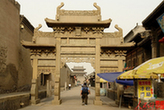While various celebratory activities are being held in observance of the 100th anniversary of China's landmark 1911 Revolution, a cultural expert warns that many of the revolution's historic sites are disappearing.
Over the past ten years, seven of the 11 sites associated with the revolution in Tianjin have disappeared, Monday's China Youth Daily reported, quoting Zhang Shaozu, a Tianjin-based historian and cultural scholar.
"Prompt efforts should be made to preserve such pieces of historic heritage in order to pass on our history and culture and to educate the next generation," Zhang said.
The 1911 Revolution was an epoch-making event that ended the Qing Dynasty (1644-1911), the last monarchy in China, after about 2,000 years of imperial rule in the country and marked the beginnings of modern China.
Zhang, 70, conducted personal, on-site investigations of Tianjin's historic sites of the 1911 Revolution in 2001. He found that there were 11 relevant sites, although estimates say the city once had 16 such sites, the newspaper said.
When Zhang investigated the sites again last year, only four remained. Many venues of the revolutionary movement and a former residence of Hu Egong, one of the leaders of the revolution, had been demolished.
The "Xiatianxian Theater" had also been destroyed. At this theater, Wang Zhongsheng, a forerunner of modern drama in China and a revolutionary martyr, staged performances to "educate" the audience and promote revolutionary ideas, the report said.
According to Zhang, the "Xiatianxian Theater" was also one of the earliest theaters operated in Tianjin.
Tianjin is not the only city seeing its historic monuments vanish, similar destruction happens all across China, Zhang told the newspaper.
Zhang attributes the destruction to a lack of awareness of the sites' significance and a lack of well-conceived city development plans.
Both the architecture and surrounding buildings should be preserved together, Zhang said.
He used the demolition of the "Xiatianxian Theater" as an example: the surrounding block had to give way to the city's development and construction plans, and the theater could no longer be preserved in isolation.
However, Zhang noted that the situation has improved in recent years.
In 2005, Tianjin issued a local regulation for the preservation of historic sites. In the following five years, the city had put 746 historic buildings and six historic building clusters under legal protection.
Source: Xinhua





Why not rent a boyfriend, or girlfriend to please parents during the Spring Festival?